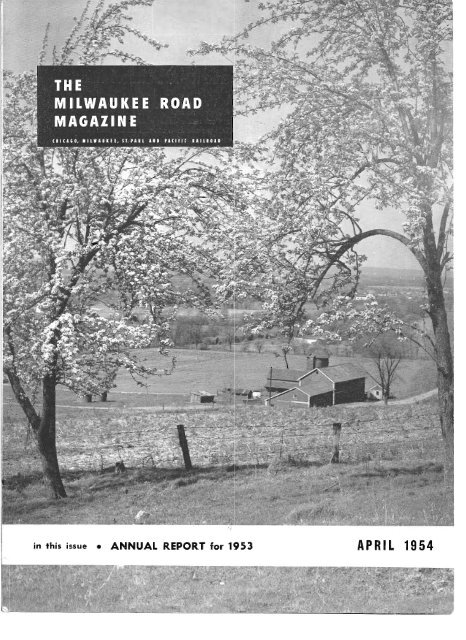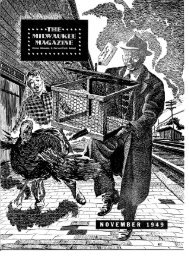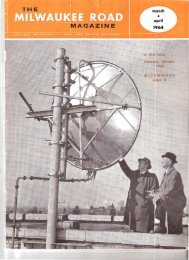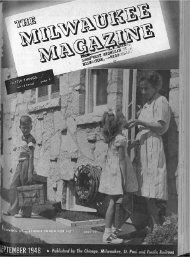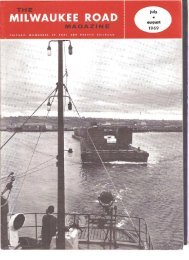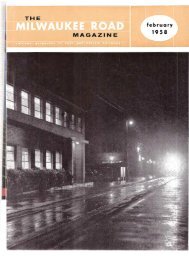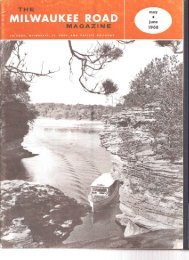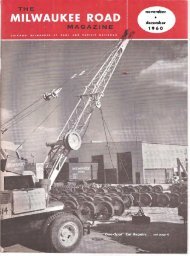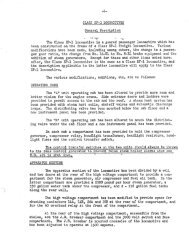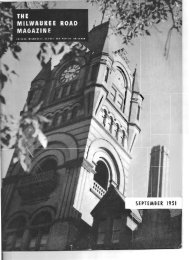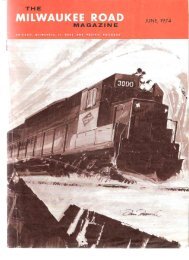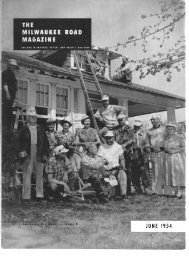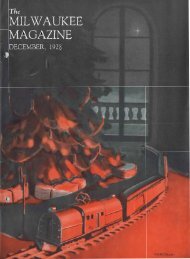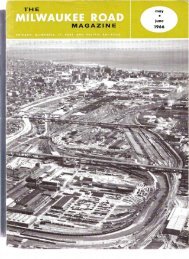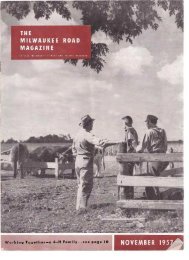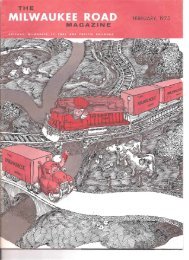April, 1954 - Milwaukee Road Archive
April, 1954 - Milwaukee Road Archive
April, 1954 - Milwaukee Road Archive
You also want an ePaper? Increase the reach of your titles
YUMPU automatically turns print PDFs into web optimized ePapers that Google loves.
THE<br />
MILWAUKEE<br />
ROAD<br />
a brief account of the<br />
highlights of the MiI,<br />
waukee <strong>Road</strong>'s opera<br />
tion in 1953 prepared as<br />
information of-special in<br />
terest to employes<br />
<strong>April</strong>. )954<br />
During 1953, our railroad took in<br />
$9,605,393 less than it did in 1952. This<br />
represents a 3.56 per cent decrease in<br />
gross revenue. As a result, our net income<br />
declined by $1,258,255 or 12 per<br />
cent. Although the first half of 1953<br />
showed our carloadings to be ahead of<br />
1952, they began to decline in the third<br />
quarter and continued to decrease<br />
through the closing months of the year<br />
with the result that for the full year they<br />
were 65,022 cars short of the number we<br />
handled in 1952. .<br />
Freight revenue was appreciably affected<br />
by the strike in the brewing industry<br />
at <strong>Milwaukee</strong>, which lasted from<br />
the middle of May to the end of July.<br />
There was an estimated loss of $4,000,<br />
000 in freight revenue on shipments of<br />
beer and the materials used in the manufacture<br />
and distribution of it, Freight<br />
revenue was further affected by the lesser<br />
movement of grain, livestock, agricultural<br />
implements, and other goods consumed<br />
by the farming industry,<br />
Passenger traffic was the lowest in any<br />
year since the end of World War II, due<br />
principally to the decline in military<br />
travel, extended use of private automobiles,<br />
and greater diversion of pas.<br />
senger traffic to other forms of trans.<br />
portation.<br />
The improvement and modernization<br />
program on our railroad has continued<br />
despite the falling revenues we experienced<br />
during the latter part of 1953.<br />
One of the major accomplishments of<br />
that program during the year was the<br />
conversion of the flat switching yard at<br />
Bensenville, Illinois, to a 70.track retarder<br />
freight classification yard, com·<br />
bining the most modern method of auto·<br />
matic switching and retarder speed can·<br />
trol.<br />
During 1953 we added 28 new diesel.<br />
electric locomotives to our fleet, and 65<br />
more diesel·electric locomotives have<br />
been delivered since January 1, <strong>1954</strong>..<br />
Based on the 1953 volume of traffic,<br />
95 per cent of road freight operation,<br />
94 per cent of passenger operation, and<br />
99 per cent of yard operation will now<br />
be performed by diesel-electric and electric<br />
locomotives.
4<br />
*Compensation of all employees<br />
totals $138,263,062 as shown<br />
in table on page 8 and includes<br />
such items as wages charged<br />
IT EMS AMOUNTS<br />
Hauling Freight . $215,384,759<br />
Carrying Passengers . 16,672,015<br />
Other Passenger Train Revenue,<br />
including Dining and Buffet<br />
Car Service . 3,084,283<br />
Transporting Mail and Express . 13,184,260<br />
Switching . . . . . 6,247,121<br />
Other Operating Revenues . 5,287,753<br />
Total Operating Revenues 259,860,1:9]<br />
Other Income-Net 3,723,374<br />
TOTAL 263,583,565<br />
IT EMS AMOUNTS<br />
Maferials, contract work,<br />
depreciation, etc 86,878,896<br />
Property and income taxes . 10,530,674<br />
Rental of equipment and joint facilities .. 9,040,744<br />
Total . $106,450,314<br />
,;, For wages and salaries of employees<br />
included in operating expenses . 131,304,863<br />
Payroll taxes for benefit of employees 7,441,326<br />
Total for EMPLOYEES . 138,746,189<br />
Interest paid SECURITY HOLDERS . 8,374,044<br />
Dividends on preferred stock 5,593,255<br />
Dividends on common stock 2,123,213<br />
Total to OWNERS . 7,716,468<br />
Payments into sinking funds required<br />
by mortgages .<br />
. Remainder for improvements to<br />
property and other corporate purposes.....<br />
. ><br />
1,816,612<br />
479,938<br />
to capital improvements, and<br />
manufacturing material. TOTAL . 263,583,565<br />
The <strong>Milwaukee</strong> <strong>Road</strong> Magazine
M. L. Bluhm RetireSi Board Elects C. L. Taylor<br />
WHEN The <strong>Milwaukee</strong> <strong>Road</strong> said farewell<br />
at the end of March to M. 1.<br />
Bluhm, vice president and general counsel,<br />
it witnessed the closing of a career<br />
which has been of particular significance<br />
to this railroad. In his 32 years of service<br />
Mr. Bluhm had an opportunity to engage<br />
actively in all of the principal<br />
branches of railroad law, and consequently<br />
was in a position to make a<br />
great contribution to the progress of the<br />
railroad.<br />
In leaving, however, he is succeeded<br />
by Carson 1. Taylor, who has been general<br />
solicitor and who himself has a<br />
brilliant record of service with the Mil.<br />
waukee. Succeeaing Mr. Taylor as general<br />
solicitor, in turn, is a welcome newcomer<br />
to The <strong>Milwaukee</strong> <strong>Road</strong>, William<br />
J. Quinn, formerly with the Soo Line<br />
as vice president and general counsel.<br />
The board of directors' action in electing<br />
Mr. Taylor and Mr. Quinn was taken<br />
at the meeting on Mar. 10.<br />
Mr. Bluhm Voices a<br />
Retirement Philosophy<br />
At a farewell luncheon given in Mr.<br />
Bluhm's honor in Chicago on Mar. 18<br />
and attended by all of the principal officers<br />
of the railroad, he voiced a retirement<br />
philosophy reflecting the same<br />
10<br />
C. L. Taylor<br />
and W. J. Qui n n t 0 Law Posts<br />
good-natured wisdom which has marked<br />
his work for The <strong>Milwaukee</strong> <strong>Road</strong>.<br />
"One of the respects in which men<br />
differ most greatly," he observed, "is in<br />
their reaction to this business of retiring.<br />
Some look forward to it as an interesting<br />
new career, while others go out<br />
feeling that they have been done a great<br />
injustice. I, personally, feel that a fellow<br />
should look upon it as a challenging<br />
assignment, just like any new joba<br />
thing to be worked at and done well.<br />
And I'm looking forward to it."<br />
An informal luncheon was held in his<br />
honor by the law department staff on<br />
Mar. 25.<br />
Mr. Bluhm has always been proud to<br />
be: known as a native of Indiana. He<br />
was born in Kendallville 65 years ago,<br />
and took his Bachelor of Arts degree<br />
from Indiana University in 1913. He<br />
studied law at the University of Chicago<br />
and was graduated from the law school<br />
in 1917. During the first World War<br />
he served as an ensign in the United<br />
States Navy, and upon returning to<br />
civilian life wel1t into private law prac.<br />
tice in Chicago. He continued in private<br />
practice until he entered the service of<br />
The <strong>Milwaukee</strong> <strong>Road</strong> as assistant gen.<br />
eral solicitor in 1922. In 1931 he was<br />
advanced to the position of general attorney,<br />
and 1° years later became gen-<br />
W. J. Quinn<br />
M. L. Bluhm<br />
eral solicitor. He was elected general<br />
counsel on Dec. 13, 1950, and was further<br />
advanced to the position of vice<br />
president on May 8, 1951.<br />
Mr. Bluhm is a member of the American,<br />
Illinois State and Chicago Bar<br />
Associations, the Society of Trial Law.<br />
yers, the American Judicature Society,<br />
the Law and Tax Committees of the<br />
A.A.R., and is currently cha'irman of the<br />
Western Conference of Railway Counsel.<br />
Commenting on his career, Mr.<br />
Bluhm expressed himself as having<br />
been extremely fortunate in the scope<br />
of the law work in which he had en.<br />
gaged. ."<br />
"It has included not just a little bit,<br />
but quite a lot, of almost everything",<br />
he said. "Among other things, there has<br />
been contract and personal injury work,<br />
commerce matters, abandonments, equipment<br />
trust matters, labor law, trial work,<br />
tax and real estate matters." Having<br />
been on the job during the two periods<br />
of reorganization-1925 to 1928, and<br />
1935 to 1945-he was called upon .to<br />
do a great deal of work in that connection,<br />
as welL<br />
Aside from his intention to take a<br />
few trips and have some fun, Mr. Bluhm<br />
has no immediate plans for his retirement,<br />
although he intends to keep busy.<br />
Should retirement prove too inactive,<br />
The <strong>Milwaukee</strong> <strong>Road</strong> Magazine
PROGRESS REPORT<br />
The J. T. Gillick Scholarship Winners<br />
IN MANY <strong>Milwaukee</strong> <strong>Road</strong> homes the<br />
selection of an outstanding high school<br />
student for the company's J. T. Gillick<br />
Scholarship is currently a matter of<br />
vital interest. As the contest moves<br />
toward the deadline for entries, it appears<br />
that there will be a large mimbel'<br />
of candidates this year. For that<br />
reason the spotlight is being trained this<br />
month on the winners of the previous<br />
contests, the three young men whose<br />
college ambitions are being furthered<br />
through grants in the name of the <strong>Road</strong>'s<br />
well-known retired operating vice president.<br />
When the scholarship was first announced,<br />
in 1951, Gary Edward Purdy,<br />
stepson of Russell O. Chambers, pumper-water<br />
tester at Aberdeen, S. D., had<br />
just been graduated from the Aberdeen<br />
Central High School. Although his<br />
scholastic rating had earned him a small<br />
scholarship at a teacher's college, Gary<br />
was hoping to go on to a good engineering<br />
school. From a financial standpoint,<br />
a complete college education seemed out<br />
of reach, but winning the newly-offered<br />
J. T. Gillick Scholarship brought the<br />
hoped-for break.<br />
12<br />
Gary Purdy (lower left) pictured on a recent inspection trip to<br />
Malden, Mo., and Oklahoma City, Okla., with the Arnold Air<br />
Society, the honorary Air Force club.<br />
"You may be sure that you won over<br />
exceedingly keen competition", wrote<br />
the chairman of the award committee in<br />
notifying Gary that he was their unanirr:ous<br />
choice. Was their judgment correct,<br />
was the choice justified? Let's look<br />
at the score.<br />
Last year, in his sophomore term<br />
at South Dakota State College at Brookings,<br />
Gary Purdy was declared winner<br />
of the Sigma Tau scholarship award.<br />
This award is conferred each year by<br />
the honorary engineering society on the<br />
student who maintains the highest average<br />
during his freshman year in engineering.<br />
Gary compiled a 3.7 average, of<br />
the maximum 4.0 obtainable. That<br />
should tell the story.<br />
What are his current ambitions, his<br />
prospects for the future? To get ahead<br />
in the field he has chosen, Gary has<br />
found that he needs to spend many hours<br />
each night on book work. At the same<br />
time he manages t6 take part in campus<br />
activities and this year is serving as captain<br />
of the ROTC rifle team. His extracurricular<br />
program also includes membership<br />
in Sigma Tau, the Arnold Air<br />
Society, an honorary Air Force club, the<br />
American Institute of Electrical Engineers,<br />
and the photography club.<br />
By the look of things, Gary will graduate<br />
next year with a B.S. degree in<br />
electrical engineering-electronics option.<br />
Afterward, as the result of the Reserve<br />
Officers Training Corps training<br />
program in which he is enrolled, he expects<br />
to spend two years in the Air Force<br />
as a second lieutenant. During those<br />
years he hopes to attend an advanced<br />
school and get a Master's Degree in<br />
electronics. There's a chance, of course,<br />
that this plan may not work out, in which<br />
case he intends to work for an M.S. degree<br />
after he is out of service, provided<br />
he can earn another scholarship or get<br />
a G.I. grant to defray expenses. After<br />
that, with industry clamoring for engineers,<br />
it should be smooth sailing.<br />
Leonard Benton Fowler, who won the<br />
J. T. Gillick Scholarship in 1952, comes<br />
from La Crescent, Minn., where his<br />
father, Ernest F. Fowler, is signal repair<br />
and maintenance man. Through four<br />
years at Central (High School in La<br />
Crosse, Leonard held top marks in his<br />
class, while at the same time he participated<br />
in a well-rounded schedule of<br />
The <strong>Milwaukee</strong> <strong>Road</strong> Magazine
The <strong>Milwaukee</strong> <strong>Road</strong> Choral Club as it appeared during the pre-Christmas concert in the Chicago<br />
Union Station. The entire group was not able to be present for this late evening performance.<br />
At the far end of the room Assistant Voice balance among the soprano, performance.<br />
Treasurer Rosebud Wennerberg had set alto, tenor and bass sections being a Even a casual glance at the activity in '<br />
up shop in a six-year·old's desk and was matter of real importance, the club urges the room would have given a stranger a<br />
busily taking the attendance record.· every member to be on hand for each pretty good idea of what holds this<br />
Below: One of the more immediate rewards for their performances are Meilahn, president of the Chicago Chapter of Valparaiso University<br />
the coffee-and-sandwich sessions which usually follow. Here Bruce Guild, and Mrs. August Brown, ways ;nd means chairman, express their<br />
Mitchell (being pointed out) is surprised to find himself the subject appreciation of the performance to President E. J. Stoll (left) and<br />
of a "Happy Anniversary To You" rendition. Below Right: Mrs. H. A. Director Glenn Jorian following the concert.
Assistant Comptroller W. P.<br />
Heuel (right) and Nurse Wan·<br />
da Mis look on as Fullerton<br />
Avenue employes file into the<br />
X-ray unit. The others, left to<br />
right: H. F. Koretke, Marion<br />
Rieter, Patricia Jeuk, Ida Gotti,<br />
Andrew Gallagher, Harry Bandelin,<br />
Marianne Gleich and Mike<br />
Samp.<br />
Accounting Personnel Endorse HEALTH PROGRAM<br />
THE new trend toward controlling the<br />
spread of tuberculosis through public<br />
health guidance received an encouraging<br />
boost in March from <strong>Milwaukee</strong> <strong>Road</strong><br />
accounting department employes in Chicago.<br />
On the morning of Mar. 30 an<br />
X.ray mobile unit backed up to the Fullerton<br />
Avenue office building, and by<br />
noon of the following day 975 employes<br />
had taken part in a mass chest screening.<br />
The turnout represented 83 per cent of<br />
the total personnel.<br />
The screening was a direct endorsement<br />
of a cooperative program instituted<br />
by the Tuberculosis Institute of Chicago<br />
<strong>April</strong>, <strong>1954</strong><br />
and Cook County and the Municipal<br />
Tuberculosis Sanitarium to serve the<br />
city and surrounding suburbs. Its pur.<br />
pose is to uncover previously undetected<br />
cases of tuberculosis and to help afflicted<br />
persons get treatment.<br />
At present tuberculosis ranks seventh<br />
in the United States among the "killer"<br />
diseases. Fortunately, new drugs and<br />
surgical procedures are bringing down<br />
the death rate and shortening the period<br />
of treatment. The trend is toward more<br />
patient treatment in the community,<br />
rather than confinement in tuberculosis<br />
hospitals. As treatment facilities become<br />
View inside the X- ray unit.<br />
Shown left to right: Technician<br />
M. J. Holm, Andrew<br />
Gallaghe(, Harry Ban del in,<br />
Mariann'e Gleich, Marie Kul·<br />
ton, Technician Leo Arnold<br />
and Mike Samp (standing before<br />
X- ray device.)<br />
more readily available, the need increases<br />
to detect the unknown cases as early as<br />
possible.<br />
In Chicago, agencies such as the Heart<br />
Association and the lllinois Division of<br />
the Americ'an Cancer Society have joined<br />
forces with the municipal program for<br />
mass 7hest fC-rays, since many cases of<br />
lung and heart pathology are being<br />
brought to light through the X-ray surveys.<br />
A recent statement from the American<br />
Cancer Society points out that there<br />
has been an increase in the age specific<br />
death rate from lung cancer of about 200<br />
per cent since. 1933, and that less than.<br />
one case out of 20 is cured because the<br />
disease is usually inoperable by the time<br />
the patient starts treatment. A chest X.<br />
ray can usually detect lung cancer before<br />
the symptoms become apparent.<br />
All findings made in the surveys remain<br />
confidential, although a complete<br />
report will be sent .to a personal<br />
physician upon request. In the case of<br />
the <strong>Milwaukee</strong> <strong>Road</strong> employes who<br />
volunteered for last month's screening,<br />
they may, if they wish, get help with<br />
individual problems from Miss Wanda<br />
Mis, the company nurse. Miss Mis is<br />
well qualified to act as an adviser, having<br />
been nurse consultant at the Tuberculosis<br />
InstitUte of Chicago and Cook County<br />
before being employed by the raifroad.<br />
17
Law Department<br />
a p p<br />
Effective Apr. 1, <strong>1954</strong>:<br />
C. 1. Taylor has been elected vice<br />
president and general counsel, succeeding<br />
M. 1. Bluhm who retired on Mar. 31,<br />
and W. J. Quinn has been elected<br />
general solicitor succeeding Mr. Taylor.<br />
(Article on page 10.)<br />
Finance and Accounting<br />
Department<br />
Effective Apr. 1, <strong>1954</strong>:<br />
R. N. Edman is appointed auditor of<br />
equipment accounts, succeeding C. W.<br />
Meier who retired Mar. 31. Mr. Edman<br />
is a native of Chicago and entered the<br />
employ of the <strong>Road</strong> in the Chicago accounting<br />
departmen!in November, 1922.<br />
His entire service has been in the finance<br />
and accounting department. Since <strong>April</strong>,<br />
1952, he has been statistician in the<br />
office of vice president-comptroller.<br />
R. N. Edman L. W. Dietrich'<br />
Safety Department<br />
Effective Apr. 1, <strong>1954</strong>:<br />
1. W. Dietrich. \s appointed district<br />
safety engineer with headquarters ;0<br />
Tacoma, territory Idaho and Coast Divisions,<br />
succeeding H. J. McMahon who<br />
retired Mar. 31. Mr. Dietrich started<br />
with the <strong>Road</strong> io station service at Missoula,<br />
Mont., in 1922. Later he was<br />
perishable freight inspector at Avery and<br />
St. Maries, Idaho, and at Malden, Wash.<br />
Since 1947 he has been freight service<br />
inspector in Seattle.<br />
Traffic Department<br />
Effective Mar. 15, <strong>1954</strong>:<br />
J. M. Cunningham is appointed<br />
freight traffic manag€r, sales and service,<br />
with office at Chicago, m., succeeding<br />
18<br />
•<br />
o I n t Ul e<br />
1. M. Cunningham F. W. Baker<br />
J. O. Mcllyar, deceased. Mr. Cunningham<br />
started with the <strong>Road</strong> in Vancouver,<br />
B. c., in 1920 as city freight and passenger<br />
agent, was later commercial agent<br />
and general agent there, and subsequently<br />
general agent at Winnipeg, Man,.,<br />
Duluth, Pittsburgh and Chicago. Since<br />
September, 1948, he has been district<br />
freight traffic manager, New York City.<br />
F. W. Baker is appointed district<br />
freight traffic manager, New York, N. Y.,<br />
succeeding J. M. Cunningham. Entering<br />
service at Kansas City in 1920, Mr. Baker<br />
was city freight agent and traveling<br />
freight agent there, and subsequently division<br />
freight and passenger agent at<br />
Aberdeen, S. D., and Terre Haute. Since<br />
August, 1950, he has been general agent<br />
in Pittsburgh.<br />
George Neu is appointed general<br />
agent at Pittsburgh, Pa., succeeding F.<br />
W. Baker. Mr.<br />
Neu, who started<br />
in the Chicago<br />
passenger department<br />
in 1927, was<br />
employed for a<br />
time in the departments<br />
at Tacoma<br />
and Portland,<br />
and was<br />
later city freight<br />
and passenger<br />
agent in Tacoma,<br />
George Neu<br />
traveling freight and passenger agent at<br />
Spokane, and division freight and passenger<br />
agent at Aberdeen, S. D. Most<br />
recently he has been divisi90 freight<br />
agent at Minneapslis.<br />
Effective Mar. 16,<strong>1954</strong>:<br />
M. J. Martin is appointed traveling<br />
freight agent with headquarters at Minneapolis,<br />
succeeding 1. P. Gran, resigned.<br />
An employe of the <strong>Road</strong> in Minneapolis<br />
since 1930, Mr. Martin has been chief<br />
n t<br />
clerk in the general north western<br />
freight agent's office there since September,<br />
1952.<br />
K. G. Hosfield is appointed city<br />
freight agent at Des Moines, succeeding<br />
M. E. Steen, transferred. Starting with<br />
the railroad in 1947, Mr. Hosfield has<br />
been chief clerk in the traffic department<br />
in Des Moines since October, 1952.<br />
Effective Apr. 1, <strong>1954</strong>:<br />
O. E. Glass is appointed city passenger<br />
.agent, Cleveland, Ohio, succeeding<br />
G. Henderson, resigned. Mr. Glass entered<br />
service in <strong>Milwaukee</strong> in 1936,<br />
where since 1948 he has been assistant<br />
ticket agent in the <strong>Road</strong>'s station ticket<br />
office.<br />
F. C. Foug is appointed city ticket<br />
agent in <strong>Milwaukee</strong>, succeeding M. C.<br />
Toll who died Mar. 7. Mr. Foug, an<br />
employe of the <strong>Road</strong> since 1924, has<br />
been city passenger agent in <strong>Milwaukee</strong><br />
since July, 1951.<br />
G. M. Kapke is appointed city pas.<br />
senger agent in <strong>Milwaukee</strong>, succeeding<br />
F. C. Foug. Starting with the <strong>Road</strong> in<br />
1934, Mr. Kapke has been ticket clerk<br />
in the station ticket office in <strong>Milwaukee</strong><br />
since 1951.<br />
Effective Apr. 16, <strong>1954</strong>:<br />
S. P. Elmslie is appointed division<br />
freight agent, Minneapolis, succeeding<br />
S. P. Elmslie W.G.Orr<br />
George Neu. Mr. Elmslie entered service<br />
in 1923 at Duluth and was subsequently<br />
city freight agent there. He was<br />
formerly traveling freight agent at Detroit<br />
and both city freight agent and<br />
traveling freight agent at Minneapolis.<br />
Since March, 1952, he has been general<br />
agent in Indianapolis.<br />
W. G. Orr is appointed general agent,<br />
Indianapolis, succeeding S. P. Elmslie.<br />
Mr. Orr has been with the traffic depart-<br />
The <strong>Milwaukee</strong> <strong>Road</strong> Magazine
I<br />
I I<br />
"I'LL BE ON A ONE HOUR<br />
Retirement Benefits<br />
Greatest Ever<br />
RAILROAD employes and their depend<br />
. EARLIER SCHEDULE WESTBOUND ents, in the year ended June 30, 1953,<br />
TO ST. PAUL·MINNEAPOLlS."<br />
received the largest amount of benefits<br />
ever paid in a 12-month period. Altogether,<br />
969,000 persons received benefits<br />
of $558,000,000 during the year.<br />
THE<br />
NhlWAUKEE<br />
ROAD<br />
Effective with daylight saving time, <strong>April</strong> 25,<br />
the Morning HIAWATHA No. 5 will leave<br />
Chicago daily 9 :30 AM Central Standard Time<br />
and operate one hour earlier through to the<br />
Twin Cities.<br />
Retirement benefit payments totaling<br />
$365,000,000 went to 406,000 retired<br />
employes and their eligible wives. The<br />
remaining $193,000,000 was divided as<br />
follows: $95,000,000 to 210,000 sur<br />
Route of the Super Dome HIAWATHAS vivors of deceased employes; $54,000,<br />
000 to 224,000 unemployed workers,<br />
The above sketch and brief announcement left no doubt about the fact that the and $44,000,000 to 158,000 sick or inwestbound<br />
Morning Hiawatha will be on an earlie1' schedule dm'ing the period jured employes.<br />
of daylight saving time. Printed 01'1 postcards, the announcement went to all<br />
foreign line ticket. agents, passenger traffic officers and tour and travel bureaus<br />
throughout the country, in addition to <strong>Milwaukee</strong> <strong>Road</strong> agents and passenger<br />
representatives.<br />
Have You Forgotten<br />
What You Really Owe?<br />
"MOST American families think they<br />
have a pretty good idea of what they<br />
owe," says the Manufacturer's Record.<br />
CAN YOU NAM E TH EM?<br />
THE FOLLOWING initials are the "reporting<br />
marks" by which freight cars<br />
of different railroads are identmed and<br />
reported for operating and accounting<br />
purposes. See how many of the ten<br />
railroads you can identify from their<br />
reporting marks; then turn to page 45<br />
for verification.<br />
service is to be given, the railroad employe<br />
should make sure that his claim<br />
agent has his correct number and that<br />
it is entered correctly on the forms. In<br />
the case of sickness benefits, the appli<br />
cant himself is responsible, since he<br />
mails his application directly to the<br />
board.<br />
When writing about retirement bene<br />
.fits, the social security account number<br />
"So much for:- the department store bills,<br />
so much for doctors' bills, the mortgage<br />
on the house or farm, and so on. For<br />
the average family, the total is close to<br />
$2,900, according to the National Chamber<br />
of Commerce.<br />
"But as citizens, everyone owes an<br />
other debt likely to be forgotten. That's<br />
the national debt. Presently the national<br />
debt totals about $274.5 billion, or about<br />
$6,008 per family. Interest alone on<br />
l.B&'O should be shown, unless a claim has the national debt amounts to $144 an<br />
2. C P<br />
3. C I M<br />
4. D L &' W<br />
been .filed and the board has assigned a<br />
claim number. Then the claim number<br />
should be shown. For survivor benefits,<br />
the applicant should show both the sonually<br />
per family. These are among the<br />
reasons why all of us can have more if<br />
the government spends less." .<br />
Incidentally, according to the Library<br />
5. M E C<br />
6. NYC<br />
7. N Y S W<br />
cial security number of the deceased and<br />
his own, if any. Again, if a claim number<br />
has been assigned, that number<br />
should be shown.<br />
of Congress, the U. S. national debt is<br />
nearly double that of the rest of the<br />
world, excluding Russia, China, Yugoslavia,<br />
Hungary, Germany and a few<br />
8. P R R<br />
other areas for which no public debt<br />
9. S P S<br />
10. V G N<br />
Man hours measure the time it takes a man<br />
to do a ;ob that any woman could do i"<br />
minutes if it didn't require a ma,,'s strength.<br />
statistics are available. While we owe<br />
$274.5 billion, the rest of the world<br />
(excluding the countries mentioned)<br />
owes only a combined total of $140.5<br />
Show Social Security Number,<br />
Retirement Board Urges<br />
I] 0/ first you don't succeed, see if maybe you<br />
haven't still got your brakes on.<br />
billion.-from the Norfolk and Western<br />
Magazine, March <strong>1954</strong>.<br />
A REMINDER from the Railroad Retirement<br />
Board urges that the correct social<br />
security account number be shown on all<br />
correspondence with the board, to help in<br />
processing claims and answering letters<br />
more promptly. Since the board keeps<br />
records on some 9,000,000 persons and<br />
pays benefits to nearly a million each<br />
year, it is virtually impossible to locale<br />
files or records by name only.<br />
Unemployment claims, particularly,<br />
are often submitted with an incorrect<br />
number or with Done at all. If prompt<br />
22<br />
Notice-Members of The <strong>Milwaukee</strong> <strong>Road</strong> Women's Club<br />
THE 30th anniversary get-together luncheon of the 59 chapters of The<br />
<strong>Milwaukee</strong> <strong>Road</strong> Women's Club will be held in the grand ballroom of<br />
the La Salle. Hotel in Chicago on Saturday, June 12, at 1 P.M. Chicago<br />
daylight sav.ing time; price, $2 per person.<br />
All voting members are invited to attend. Please make reservations<br />
not later than May 31 through your local chapter president, who will<br />
supply detailed information.<br />
Etta N. Lindskog, Secretary General<br />
The <strong>Milwaukee</strong> <strong>Road</strong> Magazine
Good Old Tear Jerker<br />
FELLOW named John Crosby who<br />
writes a newspaper column about<br />
radio and television shows, recently<br />
gave the industry some good natured<br />
kidding.<br />
Tragedy shows, says Crosby, seem<br />
to be increasing. Each new show is<br />
more of a tear jerker than the last.<br />
Seems like the sadder the show the<br />
greater its chances for success.<br />
As long as that's what people want,<br />
Crosby makes a few show suggestions<br />
of his own, plus some others that have<br />
come to his attention. They include<br />
the following:<br />
"Share Their Grief"-Each week<br />
the television camera takes you to a<br />
new and different funeral.<br />
"Waiting at the Church"-Jilted<br />
brides and rejected suitors appear on<br />
this show to describe their collapsed<br />
love affairs. The most heart-breaking<br />
tale wins the unhappy boy or girl a<br />
dinner at the Stork Club.<br />
"Hit the Skids"-Bums are collected<br />
from the streets to appear on a<br />
show to tell how they went downhill.<br />
Bum who has fallen the lowest wins<br />
the prize. -.<br />
"You Sent Them Up"-People recently<br />
released from prison confront<br />
the people who sent them up. Everyone<br />
shakes hands, makes up, and cries<br />
a little.<br />
"They're all heart-warming ideas,<br />
chock full of human interest", says<br />
Crosby, and he can't understand why<br />
someone hasn't taken them up yet.<br />
-"After Hours" in Enterprise<br />
Excise Tax on Tickets Now 10 Per Cent<br />
MILWAUKEE ROAD ticket sellers had manager, pointed out that, although it<br />
good news for passengers purchasing seems slight, it means, for example, a<br />
tickets on and after Apr. 1. The bill cut· saving of $8.69 to an individual pur<br />
ting excise taxes, which President Eisenchasing a round trip ticket from Chicago<br />
hower signed into law on Mar. 31, to Seattle, with a roomette.<br />
became effective the following day and, "Of course, if the entire 15 per cent<br />
among other reductions, cut the tax on tax had been removed, as it should have<br />
passenger fares from 15 to 10 per cent. been," he added, "we could really offer<br />
This levy, the Federal Transportation the passenger a saving ... $26.07 to be<br />
Excise Tax, which came into being as a exact.<br />
wartime measure, has been called the "To put it another way, The Milwau<br />
"keep-'em-off-the-trains" tax. It has been kee <strong>Road</strong> was obliged in 1953 to collect<br />
widely criticized because of the unfair from its passengers and pass along to<br />
position in which it places public trans the federal government $2,303,319.15.<br />
portation agencies in their competition Under the new law we will be obliged<br />
with private automobiles. The tax was to collect $1,535,546.i0 on the same<br />
first enacted in October, 1941 at an volume of business. It is a pleasure to<br />
effective rate of 5 per cent. In Novem. be in the position of telling the traveling<br />
ber, 1942 Congress raised it to 10 per public that they can now keep the dif.<br />
cent, and on Apr. 1, 1944 to 15 per cent. ference, or some $767,773.05. We all<br />
The present law- makes no change in ." hope, of course, that it will not be too<br />
the 3 per cent tax on freight charges. long before we-can compete on more<br />
Commenting on the reduction of 5 even terms with the private automobile<br />
per cent in the tax on passenger fares, by selling our passengers completely tax<br />
Harry Sengstacken, passenger traffic free transportation."<br />
CONTENTMENT<br />
We all dream of great deeds and high positions away from the pettiness and humdrum of<br />
ordinary life. Yet success is not just occupying a lofty place or doing conspicuous work;<br />
it is being the best that is in you. Rattling around in too big a job is much worse than<br />
filling a small cne to overflcwing. Dream, aspire by all means; but do not ruin the life<br />
you must lead by dreaming pipe dreams of the one you would like to lead. Make the most<br />
of what you have and are. Perhaps your immediate task is the one sure way of proving<br />
your mettle. Do the thing near at hand, and greater things will come to your hand to<br />
be done. -Enterprise<br />
THE ENGINEERS. <strong>Milwaukee</strong> <strong>Road</strong> engineers, including division engi Association held in Chicago on Mar, 16, 17 and 18. Chief purpose of<br />
neers, are shown here at a department staff 'meeting called by Chief the department meeting was to discuss maintenance of way programs,<br />
Engineer W. G. Powrie (seated third from right, far table) in con J H. Schnaitman, auditcr of capital expenditure (standing, seventh<br />
nection with the annual meeting of the American Railway Engineering from right) was present to give a briefing on accounting practices.
hOlDe departlDent<br />
SANDWICHES<br />
to Pack<br />
and Carry<br />
Make a neat packet for san,dwiches by<br />
folding..waxed paper drugstore style, with<br />
a double fold oyer the top. To pack a<br />
piece of pie or cake, tape one paper plate<br />
upside down on top of another.<br />
lunch box ideas for office, heavy job or schoo,[<br />
IT IS estimated that 30 million sandwiches<br />
are eaten each day in the United<br />
States. Just as the Earl of Sandwich preferred<br />
an out-of-hand serving of bread<br />
and meat to a meal that would take him<br />
away from the gaming table, so the<br />
sandwich now serves as the basis of the<br />
carried lunch for thousands of office<br />
workers, laborers and school children.<br />
Homemakers with lunches to pack for<br />
several members of the family can<br />
streamline much of the work if they have<br />
a food freezer, or sufficient storage space<br />
in the freezing compartment of their refrigerator.<br />
Sandwiches which are properly<br />
prepared can be kept for as long as<br />
a week at a time in the refrigerator, and<br />
for two weeks in a freezer.<br />
It takes little more time to prepare a<br />
week's sandwiches, and it's only a little<br />
more work, than the daily routine of<br />
preparing them on a day-to-day basis.<br />
Set up a production line. Prepare the<br />
fillings first and store them in the refrigerator.<br />
layout as many slices of<br />
bread as you think you will need. Have<br />
ready softened butter or margarine, so it<br />
will spread evenly on the bread and prevent<br />
fillings from soaking in.<br />
24<br />
Spread fillings in one operation, using ardize portions by using an ice cream<br />
a flexible spatula. You'll find that scoop or other definite measure. Fillings<br />
spreading goes much faster if you stand- should be generous enough that the<br />
LUNCH BOX TREATS<br />
FOR high nutritive value, it is 'always<br />
well to include sandwiches<br />
made with enriched bread, rye<br />
bread, Boston Brown, hamburger<br />
buns, or crisp rolls. A nut bread<br />
sandwich is a special treat.<br />
Quick Nut Bread<br />
1 cup bran<br />
1 cup milk<br />
1 cup sifted all.purpose flour<br />
2 tsps. double-acting baking powder<br />
1 tsp. salt<br />
Y2 cup sugar<br />
1 egg<br />
Y2 cup chopped [l.llts<br />
Sift tOgether flour, baking powder,<br />
salt-and sugar. Add bran-milk mixture<br />
and' egg and beat 2 minutes. Fold in<br />
nuts. Turn into greased and waxed<br />
paper lined 8 x 3Y2 loaf pan. Bake in a<br />
350 0 P. oven 45-50 minutes. Remove<br />
from pan, cool before cutting.<br />
A double-fold wrap of waxed paper<br />
makes an air-tight packet for pickles,<br />
olives or carrots. You can even<br />
peel a tomato and wrap it whole in<br />
this type of package.<br />
Always pack some fruit. Fresh fruit<br />
is popular at any time, but for a<br />
change include canned, cooked or<br />
dried fruit.<br />
Fill the vacuum bottle with milk,<br />
cocoa, flavored milk drink, or hot<br />
soup. An occasional baked custard<br />
or other pudding makes a hit.<br />
The <strong>Milwaukee</strong> <strong>Road</strong> Magazine
the teen-age score:<br />
HOW TALL IS TALL?<br />
You probably know it's smart to be tall<br />
these days. You don't need to duck your<br />
head any longer and hunch down. Even<br />
if you are a big girl, there are plenty of<br />
boys bigger. But how tall is tall? What<br />
are you shooting for? .<br />
Growth is closely linked with a factor<br />
that belongs exclusively to you-your<br />
"growth potential". This potential sets<br />
the limit you can hope to reach on an<br />
ideal diet before your bony skeleton becomes<br />
mature and doesn't grow any<br />
more. When you achieve your potential,<br />
you will be as tall as you can be. Your<br />
skeleton will be fully developed and the<br />
bones will be properly mineralized; that<br />
is, dense and sturdy. And you can<br />
achieve this potential if you stay well<br />
and if you eat enough of the' highvoltage<br />
foods that will keep the wheels<br />
turning.<br />
If you reach your top growth early,<br />
don't worry. It just shows you're a fast<br />
worker. Or you may be smaller than you<br />
should be. You can correct that by<br />
simply moving over onto a diet of richsource<br />
foods and staying there. Then<br />
you'll step into a regular, even pattern of<br />
growth and keep on going untll<br />
.<br />
you<br />
reach your limit.<br />
As a boy, height is pretty important to<br />
you, so you'll try to do your best. If you<br />
are a girl, you probably have some silly"<br />
idea that being small is an asset. Many<br />
teen-age girls obviously think so. They<br />
cut out a lot of important foods and<br />
come up stunted in growth. Sure 1y<br />
you<br />
don't want to be stunted. That is as out<br />
of date as the idea of tiny feet for<br />
Oriental women.<br />
You may be indifferent to talk about<br />
nutrition-you hear a lot at school and<br />
at home-but consider that the teens are<br />
your growing years. Your birthday mark<br />
on the wall will keep the score. Nobody<br />
can make you take nutrition seriously,<br />
but remember that you may be scored on<br />
your appearance ... and in this modern<br />
age height is an asset.<br />
IT'S A MATCH. Spring goes to a woman's head, meaning that usually she wants a new hat. And<br />
sometimes a new bag to go with it. These matched sets can be worn now and right through the<br />
summer. The striped cloche is crocheted in tri -color and matched to a drawstring bag made from<br />
-you'd never guess-a cereal box. Still tops in fashion this spring are the open crown, the tiny<br />
collar and the clutch purse. As shown here, jet beads were added for sparkle. Direction leaflets<br />
for CANDY STRIPED HAT AND BAG and HAT, BAG AND COLLAR SET may be had free of<br />
charge from The <strong>Milwaukee</strong> <strong>Road</strong> Magazine, Room 356 Union Station, Chicago 6, III.<br />
26<br />
for happier housekeeping,<br />
Crocheted Chair Seats<br />
NEW furniture always makes a home<br />
look lovelier, but only vigilance against<br />
dust and grime will keep it that way.<br />
'Chair pads and seat cushions crocheted<br />
.of sturdy rug yain will prolong the life<br />
and beauty of your furniture. Free instructions<br />
are available for making two<br />
attractive designs, a swirl striped pattern<br />
for round seats and a striped border design<br />
for the square type. For a copy of<br />
CROCHETED CHAIR SEATS, write<br />
to The <strong>Milwaukee</strong> <strong>Road</strong> Magazine,<br />
Room 356 Union Station, Chicago 6, Ill.<br />
•<br />
In day-by-day living, sundry little<br />
tricks can make your housekeeping<br />
easier. For instance, a thin coating of<br />
furniture wax, applied to painted furniture,<br />
will make it more scratch resistant<br />
and easier to clean. Frequent polishing<br />
and waxing will help preserve any wood<br />
finish.<br />
If furniture does get marred, a bit of<br />
resourcefulness will help disguise the<br />
scars. For example, iodine will hide<br />
scratches in mahogany or other dark<br />
woods. Deep cracks can be darkened<br />
with wood stain, then filled in with<br />
white shellac, applied with a fine brush.<br />
Rub light scratches with the meat of a<br />
brazil nut or walnut. To remove heat<br />
marks from shellacked or varnished surfaces,<br />
apply spirits of camphor or essence<br />
of peppermint to the spot, then polish.<br />
It's an Idea!<br />
HAVE you ever used 'a toy balloon to<br />
block a baby's bonnet? After sudsing,<br />
rinsing and squeezing excess moisture<br />
from the bonnet, ease it back to shape<br />
and insert a balloon inflated to the correct<br />
size. The bonnet will dry to fit.<br />
The <strong>Milwaukee</strong> <strong>Road</strong> Magazine
casionally works with the club in her<br />
mother's absence, is a pianist with the<br />
Chicago Symphony Orchestra.<br />
The <strong>Milwaukee</strong> <strong>Road</strong> Choral Club,<br />
one of relatively few such railroad-sponsored<br />
organizations in the country, was<br />
formed chiefly through the efforts of<br />
G. M. Dempsey, general inspector, divi.<br />
sion of safety. With some organizational<br />
assistance from the public relations de.<br />
partment, the club came into being in<br />
the fall of 1937, with Mr. Dempsey,<br />
who was to head the group for many<br />
years, installed as its president.<br />
At that time the principal purpose was<br />
the development of a program for<br />
presentation at Christmas time. That<br />
performance proved to be so popular<br />
that it is now a tradition among the<br />
thousands of people working in and<br />
passing through the station. In addition,<br />
the group is now sought for many per·<br />
formances before clubs and church organizations.<br />
They accept as many of these in.<br />
vitations as they can prepare for, the<br />
average being about 10 a year before a<br />
total audience of some 3,000 people, in<br />
addition to the heavy Christmas program<br />
in the Chicago Union Station.<br />
Few of the many compliments that<br />
have come to the group have meant quite<br />
as much as the invitation to present a<br />
concert at Chicago's famous Sunday<br />
Evening Club in Orchestra Hall on Feb.<br />
28 of this year. Their 45.minute pro·<br />
gram before an audience of approxi.<br />
mately 1,200 people was received with<br />
great enthusiasm and described by many<br />
present as the best choral concert they<br />
had heard in the hall in many years.<br />
Following that performance, President<br />
<strong>April</strong>. <strong>1954</strong><br />
Railroad Hour Forecast<br />
(Continued from page 16)<br />
Stoll received this note from M. 1.<br />
Boydston, <strong>Milwaukee</strong> <strong>Road</strong> tax commis.<br />
sioner:<br />
"All of us, of course, are aware of the<br />
fine job you and the Choral Club are doing,<br />
but it is always gratifying to know<br />
that your efforts are appreciated outside<br />
the company also.<br />
"Mr. Morris Hauser, Executive Secre.<br />
tary of the Illinois Association of School<br />
Boards, with whom I have frequent contact<br />
on school tax matters, is a member<br />
of the Chicago Sunday Evening Club.<br />
He called me earlier this week to tell me<br />
that he and his wife attended last Sunday's<br />
meeting, at which the Choral Club<br />
sang. He wanted me to know how much<br />
he personally enjoyed your program; and<br />
further told me that many of his friends<br />
in attendance had made similar com·<br />
ments to him."<br />
Also as a result of that concert, John<br />
Morrissey, retired switchman and vete.<br />
ran of the club's tenor section, received<br />
this warm note of appreciation from<br />
friends in his home town of Wheaton,<br />
Ill. :<br />
"We went to the Chicago Sunday<br />
Evening Club last night with our new<br />
pastor, Rev. Emil G. Sauer, who delivered<br />
the invocation. While looking<br />
over the program I said to AI, 'The Mil·<br />
waukee <strong>Road</strong> Choral Club is singing'.<br />
Al said, 'Maybe we will see Mr. Morrissey'.<br />
Sure enough, there you were,<br />
fourth man coming-in the back row.<br />
"May I say we did so enjoy that fine<br />
. singing! I just thought I would let you<br />
know."<br />
Since groups such as The <strong>Milwaukee</strong><br />
<strong>Road</strong>'s choristers rarely find the incentive<br />
to devote time and effort to such<br />
A SERIES of original musical shows will be featured on The Railroad<br />
Hour, starting in May. In the 292nd broadcast on May 3, Gordon<br />
MacRae will star with Lucille Norman in "Birthday", accompanied by<br />
Carmen Dragon's orchestra and the mixed chorus. The Railroad Hour<br />
is heard every Monday night on the NBC network at 7 P.M. Central<br />
Time, 9:30 P.M. Mountain Time, and S:30 P.M. Pacific Time.<br />
Other shows of the month are: ,_.<br />
May 10-"Wonderful One.HossShay" with Lucille Norman<br />
May 17-"Around the World in SO Days" with Lucille Norman<br />
May 24-"Penny Whistle" with Lucille Norman<br />
May 31-"Homecoming" with Nadine Conner<br />
an activity over so many years, it may be<br />
logical to inquire in what ways this<br />
group is different.<br />
Most of the individual members are<br />
quick to point out that having their railroad<br />
behind them is a genuine incentive.<br />
No small part of that support lies in the<br />
fact that officers and supervisors under<br />
whom the members work recognize the<br />
Choral Club as important to the rail·<br />
road's community relations program.<br />
Consequently, they willingly allow club<br />
members in their offices the bits of time<br />
here and there which they require for<br />
getting to the Union Station for weekly<br />
rehearsals and to more distant points for<br />
concerts.<br />
It is also an evident fact that the group<br />
. sHcks together' not only because they<br />
enjoy singing and doing their after<br />
"hours bit for <strong>Milwaukee</strong> <strong>Road</strong> prestige,<br />
but also because they have fun together.<br />
At least five times a year they join ranks<br />
for evening or mid-day parties, and once<br />
during the summer they hold a big com·<br />
bination picnic and outgoor songfest<br />
which some of them regard as their best<br />
concert of the year.<br />
People who have been familiar with<br />
this group over the years are not sur.<br />
prised at their success, for they have all<br />
that is required... a great deal of talent,<br />
a genuine liking for each other, sincere<br />
and gifted individuals as director and<br />
accompanist, and, most important of 'all,<br />
the backing of a company which ap·<br />
preciates their worth as agents of good<br />
will.<br />
Whose Slogan Is It?<br />
MANY railroads have slogans which are<br />
used in timetables, dining car menus,<br />
posters, advertisements and other pub.<br />
licity; some are painted on freight cars.<br />
How many of the railroads can you<br />
identify by the following slogans? Turn<br />
to page 42 for the answers.<br />
1. The Water Level Route.<br />
2. The Hoosier Line.<br />
3. Route of the Eagles.<br />
4. The Route of Phoebe Snow.<br />
5. Main Line of Mid-America.<br />
6. Route of the Hiawathas<br />
7. The Peoria Gateway.<br />
S. Route of the Rockets.<br />
9. The Bay Line.<br />
10. Main Line Through the Rockies.<br />
27
30<br />
As railroad men, do you know: WHICH ONE<br />
OF THESE DOESN'T BURN TAX DOLLARS?<br />
You're undoubtedly familiar<br />
with these traffic control devices<br />
for various forms of transportation.<br />
But do you realize that only<br />
one of them doesn't burn up tax<br />
dollars?<br />
Consider these facts. Up to the<br />
end of 1953, Federal and local<br />
governments had spent some 2<br />
billion dollars on the construction<br />
of civil airports and airways.<br />
From the turn of the century<br />
to June 30, 1953, Federal expenditures<br />
for river and harbor<br />
navigation facilities exceeded 4.3<br />
billion dollars.<br />
Highway construction in the<br />
United States has cost 39 billion<br />
dollars since 1921. Highway con<br />
struction and maintenance costs<br />
come· to about 5 billion dollars<br />
annually-with you, as a private<br />
citizen, picking up the biggest<br />
part of the bill. (For every 100<br />
ton-miles of travel, a typical personal,<br />
car pays taxes averaging<br />
34 cents while a 30-ton highway<br />
truck pays an average of only<br />
12 cents.)<br />
Railroads, on the other hand,<br />
have spent more than 20 billion<br />
dollars to install rights-of-way<br />
and other facilities. In addition,<br />
they pay taxe$' on them-which<br />
help to subsidize their competitors<br />
in the air, on the water and<br />
highways.<br />
When, therefore, the railroads<br />
say they want the opportunity to<br />
compete with other forms of<br />
commercial transportation on a<br />
free and equal basis, you can understand<br />
their position.<br />
It is their feeling that the public<br />
would be much better served<br />
if all forms of transportation<br />
were put on a truly competitive<br />
basis. Not only would each be<br />
spurred to provide constant improvements<br />
in services and facilities,<br />
but the cost would fall<br />
where it rightly belongs-on users<br />
instead of taxpayers.<br />
[The above pictures and text<br />
are from an advertisement recently<br />
published by the Eastern<br />
Railroad Presidents Conference.<br />
In its original form, the message<br />
was addressed to "trained newsmen"<br />
rather than to railroad<br />
men. -Editor]<br />
The <strong>Milwaukee</strong> <strong>Road</strong> Magazine<br />
'1
Off Line Offices<br />
WASHINGTON, D. C.<br />
J. B. Cunningham,<br />
district passenger<br />
agent with headquar.<br />
ters in Washington,<br />
D. C, has bee n<br />
elected president of<br />
the WashingtOn Passen<br />
g e r Association<br />
for <strong>1954</strong>. The association<br />
has about 400<br />
members in the<br />
Washington transportation<br />
area. Mr.<br />
Cunninghilm started J. B. Cunningham<br />
with the <strong>Road</strong> in<br />
1927 as assistant ticket agent in New York<br />
City and subsequently held various positions<br />
in the New York office. He transferred to<br />
Washington as district passenger agent in<br />
1948, since when he has been active in the<br />
association. He served on the board of directors<br />
in 1951, as second vice president in<br />
1952, and as chairman oLspecial committees<br />
in 1953.<br />
Idaho Division<br />
Mrs. Ruth White, Correspondent<br />
Office of Agent, Spokane<br />
Spokane Chapter of the Women's Club<br />
was pleased with the results of the card party<br />
held Feb. 27 at the Union Station club rooms.<br />
Mrs. Jack Webb was assisted by Mrs. A. 1.<br />
Titus in planning the affair, and Mrs. George<br />
Weseman and committee served the refreshments.<br />
Weare happy to report that J. R. Reagan<br />
has left the hospital and is living at Spirit<br />
Lake, Idaho, where he and Mrs. Reagan are<br />
making their home since his retirement. Illness<br />
kept him in the hospital most of Febru'ary<br />
and part of March.<br />
The following <strong>Milwaukee</strong> folks have been<br />
reported in and out of the hospitals within<br />
recent weeks: Train Dispatcher Roy Gaynor,<br />
Lou Coller of the B&B deparrment; Engineer<br />
C A. Nash, Operator E. M. Hartman, and<br />
Mrs.' R. M. Ferguson, wife of shovel oper·<br />
ator. Engineer Nash reported for work one<br />
afternoon not feeling too well. Next day he<br />
reported to his dOCtOr, who sent him hurrying<br />
to the hospital, and within the hour<br />
Charlie was minus his ruptured appendix.<br />
Following his release, he and Mrs. Nash took<br />
off for California and points south.<br />
) Extra Gang Foreman Doug 1. Brown<br />
passed away Mar. 3 in Spokane. He is survived<br />
by his wife Mayme at Othello, and<br />
his father and tWO brothers at Plummer,<br />
Idaho. Mr. Brown was a member of the John<br />
Bloomquist American Legion Post of Plum·<br />
mer where funeral services were held. His<br />
illness started just after extra gang operations<br />
were concluded last fall.<br />
P. Taylor has taken over his duties as agent<br />
at Worley, with M. F. Bell, now of Metaline<br />
Falls, having been assigned to the Plummer<br />
Junction agency.<br />
<strong>April</strong>, <strong>1954</strong><br />
about people of the railroad<br />
K. V. Garrett, just released from military<br />
service, has displaced Bette Ellett as agent at<br />
Calder, while the latter in turn displaced<br />
R. A. Bradshaw, third trick operator at Othello.<br />
Mr. Bradshaw will Jill the Metaline vacancy<br />
until assignment is made.<br />
By the time spring's work rolls around,<br />
Charles Lillwitz and wife will be back on the<br />
farm near Worley, after touring the COuntry<br />
by way of Florida, Chicago and <strong>Milwaukee</strong>.<br />
Carl says, "Give me the West, there's no place<br />
to compare."<br />
Mrs. GUSt Rossback, wife of a deceased<br />
dispatcher, passed away recently in Spokane.<br />
A Gold "lifetime" Pass, token of 50 years<br />
of service, was issued last month in favor of<br />
Mr. and Mrs. B. J. Casey. Conductor Casey,<br />
whose headquarters are in Spokane, has been<br />
with the <strong>Road</strong> since 1903. He started as a<br />
clerk at Wahpeton, N. D., and transferred<br />
to train service at Malden in 1909,<br />
Coast Division<br />
TACOMA<br />
E. L. Crawford, Correspondent<br />
c/o Agent<br />
President Kiley made an inspection of Tacoma<br />
shops on Mar. 26, and E. G. Kiesele,<br />
superintendent of safery, conducted a safety<br />
meeting Mar. 30, with an interesting sound<br />
movie, These meetings are an education and<br />
inspiration to hundreds of employes on the<br />
railroad.<br />
Cecil Snyder, vice chairman representing<br />
the car department on Lines West, is taking<br />
an extended leave of absence to assist Pete<br />
Moch, general chairman of all car departments<br />
on the <strong>Milwaukee</strong>.<br />
Mr. Weatherall, general car department<br />
supervisor, is a young fellow who believes<br />
that safery is one of the most important jobs<br />
on the railroad and introduced Larry Dietrich,<br />
. our new safety supervisor, to the car department<br />
employes at a meeting in the car<br />
department lunch room Mar. 25. Larry is not<br />
a stranger in Tacoma, having participated in<br />
claim prevention activities for many years.<br />
Tacoma is cooperating in the campaign<br />
for APRIL PERFECT SHIPPING MONTH,<br />
and meetings are being arranged by railroaders<br />
everywhere to join with their shipper<br />
friends in making the 18th annual perfect<br />
shipping campaign the most successful in the<br />
entire history of the program.<br />
Ticket Clerk Glen Russell visited Vancouver,<br />
B. C, with the Seattle Passenger<br />
Club last month.<br />
Henry Lemm, retired yard conductor,<br />
passed away Mar. 17.<br />
Globe trotting Ex-Chief Yard Clerk O. H.<br />
Guttormson and wife have returned from<br />
Phoenix, Ariz., where t!.ley spent the winter,<br />
and are now trying to decide where to spend<br />
the summer-a nice way to enjoy your retirement.<br />
Puyallup Valley's fame will soon be<br />
spread around the world again, for when<br />
America thinks of daffodils it thinks "Puyallup<br />
Valley.... It is a magic name in the bulb<br />
trade, and acres and acres bloomed with<br />
gold for the Daffodil Festival parade on<br />
Apr. 10. A float was entered this year by<br />
the Portland Rose Festival, which has sent<br />
its float only to the Pasadena Tournament<br />
of Roses in previous years.<br />
Chicago Terminals<br />
GALEWOOD<br />
Norma Gunderson, Correspondent<br />
Glad to welcome back Emily Young, bill<br />
clerk, who returned Mar. 1 from an extended<br />
leave of absence.<br />
Corrine Zulaff and Helen Cass, telephone<br />
operators, both underwent surgery recently<br />
and from all reports are doing nicely.<br />
Lillian Arenstein, comptometer operator,<br />
returned to Galewood Mar. 22, having Jilled<br />
a temporary position in the office of W. L.<br />
• Ennis.<br />
Neva Singerling; car record department,><br />
left recently for California, due to the illness<br />
of her sister.<br />
The daughter of Joe Novak, train department,<br />
has changed her name from Marilyn to<br />
Kim Novak and has a shiny new contract with<br />
Columbia pictures. She will star in "The<br />
Killer Wore a Badge." On Mar. 25 she appeared<br />
on the TV broadcast of the Academy<br />
Awards, modeling a gown designed for the<br />
Oscar-winning "From Here to Eternity:'<br />
The membership drive for the Women's<br />
Club, Fullerton Avenue Chapter, is still on.<br />
All who have not paid their dues for <strong>1954</strong>,<br />
or those wishing to join, can contact Dorothy<br />
Parsons, interline switching department, Galewood<br />
station.<br />
KOREAN BULLETIN. Serving jlS a yardmaster<br />
in the 724th Railway Operating Transportation<br />
Battalion, (pI. Norman A. Robertson of Sandpoint,<br />
Idaho, is helping to haul troops and<br />
supplies in Korea. He was a brakeman on the<br />
Idaho Division before entering the Army in<br />
July, 1952.<br />
31
L<br />
Second It. Wil·<br />
lia(Il B. Thomas who<br />
is on military leave<br />
from the Miles City<br />
10cO(Ilotive depart·<br />
ment, was at Camp<br />
Hale, Colo., last<br />
month for Exercise<br />
Ski Jump, the anny's<br />
<strong>1954</strong> cold weather<br />
and mountain !Cain·<br />
ing maneuver. lieu·<br />
tenant Thomas, who<br />
Second Lt.<br />
W. B. Thomas<br />
s tar ted with the<br />
<strong>Road</strong> in 1945, en·<br />
tered the army in January, 1952, and completed<br />
basic training at Fort Eustis, Va. He<br />
is currently a platoon leader in the 503d<br />
Airborne Infantry Regiment's Headquarters<br />
company.<br />
March provided a number of targets for<br />
cupid's arrows. Helen Herrick became the<br />
bride of Bob Rask, son of Mr. and Mrs. louis<br />
S. Rask, in the First Methodist Church in<br />
Billings, Monr. Priscilla Russell and Walton<br />
laird, son of Mrs. Glenn laird, were married<br />
in Southminster United Church in Lethbridge.<br />
Alta. Jean Sutherland, daughter of Mr. and<br />
Mrs. Harold Sutherland, and Jesse Wallace<br />
were married at the Assembly of God Church<br />
in l>.'1iles City. Two <strong>Milwaukee</strong> kids, Patricia<br />
Ann Kransky, daughter of Mr. and Mrs.<br />
Vernon Kransky, and Don'Helm, son of Mr.<br />
and Mrs. Nels Helm, were married in the<br />
Sacred Heart Church in Miles Ciry.<br />
March snow storms forced two airliners to<br />
put in at the Miles City airport l>.-far. 24. This<br />
was the only airport open in a wide area of<br />
the Northwest. <strong>Milwaukee</strong> streamliners operated<br />
on schedule during the same period.<br />
Word has been received from Harlowton<br />
that]' H. Fischer, retired agent, and his wife<br />
have returned from a long vacation trip<br />
through the Southwest which took them to<br />
PhoeniX, Tucson, Mesa, Los Angeles, San<br />
Francisco and Reno. In Mesa they participated<br />
in the Montana Day picnic at which 1,700<br />
Montana people were present. They also<br />
found time for a week of fishing at Guaymas,<br />
Mexico. later in los Angeles they visited<br />
with Walter Wells, retired' agent. who will<br />
be remembered by many on rhe TM.<br />
Terre Haute Division<br />
REA BUILDING<br />
T. I. Colwell, Correspondent<br />
Superintendent's Office, Terre Haute<br />
Mrs. Arthur Graam. president of the<br />
Women's Club chapter, honored the - past<br />
presidents of the organization at a potluck<br />
dinner on Mar. 18. The following past presi.<br />
dents were present: Mrs. T. I. Colwell, Mrs.<br />
Roba Huffman, Mrs. Oscar Bond, Mrs. Aaron<br />
Wright, Mrs. P. V. Bailey and Mrs. Richard<br />
Frllnzwa. The hostesses for the meeting were<br />
Mrs. Thomas Mulvihill, chairman; Mrs. Don<br />
Hehman, Mrs. Ed Bevington, Mrs. Roy Swinehart,<br />
Mrs. Bernard LeBow and Mrs. Thomas<br />
Potter.<br />
Mrs. Elbert Kenney, wife of retired conduclOr,<br />
Terre Haure, is in the hospital for<br />
observation at this writing.<br />
Mrs. Floyd Chenault, wife of engineer, is<br />
at home again after taking rreatments at the<br />
Mayo Brothers Clinic.<br />
<strong>April</strong>. <strong>1954</strong><br />
"Russo" Sims, agent at Crane, Ind., who<br />
has been in' Arizona for his heal th for the<br />
past couple of months, advises that the climate<br />
is helping him and that he is feeling<br />
inuch better. Agent Curtis C. Sims, Sr., of There is<br />
Odon, has taken over the agency at Crane,<br />
and Operator Truman K. Sims of linton has<br />
taken over at Odon.<br />
Clerk Bob Stout became the father of a NO SUBSTITUTE<br />
new bab}' boyan Mar. 20.<br />
for money in<br />
HULMAN STREET YARD<br />
E. H. Lehman, Correspondent<br />
c/o Yardmaster, Terre Haute<br />
Carman Elza Hale was seriously ill at his the BANK<br />
home in St. Bernice during the latter part<br />
of March.<br />
Brakeman George Freeman is improving<br />
after a serious illness since early in March.<br />
Engineer Carl VanMeter, who has been<br />
unable to work for the past year on account<br />
of illness, called at the Hulman Sueet round·<br />
house on Mar. 16.<br />
Conductor O. Hadden returned to work<br />
during March after an illness of several<br />
months. For future needs, for emergencies<br />
Recent retirements included Brakeman· ... save at the First Wisconsin.<br />
Harley Taylor, Carman F. M. Nipple, laborer<br />
Make regular deposits at any First<br />
T. R. Jennings, Extra Gang laborer Matr"<br />
Wisconsin office ... 13 convenient<br />
Magro, all of Terre Haute, and Thornt c..<br />
locations throughout the city.<br />
Terrell, engineer, of Bedford. Here's wishing<br />
them a clear board for happy days ahead.<br />
District Safety Inspector A. 1. Shea held<br />
several· safety meetings here Mar. 16. As<br />
these notes are being written, the Terre Haute FIRST<br />
Division is tied for first place in safe!}'.<br />
Conductor Ralph Pound was seriously ill<br />
at his home in Terre Haute on Mar. 16, and WISCONSIN<br />
during that week his brother, leslie, passed<br />
away.<br />
James 1'. Knuckey, former Hulman Street<br />
yard clerk, died at the Veterans Hospital in NATIONAL<br />
Danville, Ill., Mar. 15. Burial was in Soldiers<br />
Cemetery there. He was a member of the<br />
American -legion and Knights of Columbus BANK<br />
and a veteran of World \'{far I. He was 56<br />
}'ears of age. OF MILWAUKEE<br />
. On Mar. 16 at South Main. Yard Clerk<br />
1. S. lewis probably prevented a derailment<br />
10 southbound No. 82 when he noticed the •<br />
open swinging door on a hopper car sliding<br />
along the rail. He had the train stopped before<br />
any serious damage occurred.<br />
Section Foreman Harley Sims, of linton.<br />
Ind., who is a minister of the gospel, held<br />
Member<br />
Federal Deposit Insurance<br />
,Corporation<br />
OPERATING 161<br />
RECEIVING<br />
MOTOR TRUCKS<br />
and<br />
FORWARDING<br />
TRACTORS AND POOL CAR<br />
TRAILERS DISTRIBUTORS<br />
ESTABLISHED 1880<br />
P. D. Carroll Trucking Co.<br />
CHICAGO, ILLINOIS<br />
41
Answers to<br />
"Can You Name Them?"<br />
1. Baltimore & Ohio Railroad.<br />
2. Canadian Pacific Railway.<br />
3. Chicago & Illinois Midland Railway.<br />
4. Delaware, Lackawanna & Western<br />
Railroad.<br />
S. Maine Central Railroad.<br />
6. New York Central Railroad.<br />
7. New York, Susquehanna & Western<br />
Railroad.<br />
8. Pennsylvania Railroad.<br />
9. Spokane, Portland & Seattle Railway.<br />
10. Virginian Railway.<br />
10-day furlough with his parents, Mr. and<br />
Mrs. 1. R. Boettcher of Marion.<br />
On Mar. 11 louis A. Klumph, 80, retired<br />
<strong>Milwaukee</strong> <strong>Road</strong> car foreman, died at his<br />
home. He was a resident of Marion for 64<br />
years and had been employed by the Mil<br />
waukee for 50 years. He is survived by [wo<br />
,I daughters, Mrs. Dorothy Robison and Mrs.<br />
Bernice Bristol; four grandchildren; a brother,<br />
H. C. Klumph, and a sister, Mrs. 1. D.<br />
Smith, all of Marion.<br />
I A son, who has been named William for<br />
I ,- his late grandfather, was born to Engineer<br />
and Mrs. Robert Rogers on Mar. 16. 1£ he<br />
follows in his father's footsteps he will be·<br />
the fourth generation of the family to become<br />
an engineer. Robert's fa ther was the late<br />
William A. Rogers and his grandfather the<br />
late John Rogers, both <strong>Milwaukee</strong> <strong>Road</strong> engineers.<br />
Wilbur Swanson who had worked in the<br />
track department from 1924 to the time of<br />
his retirement in 1951 passed away Mar. 18.<br />
in Perry. He had been ill for several years.<br />
Harvey Johnson who operated a locomotive<br />
crane for the <strong>Milwaukee</strong> for many<br />
years died in a Des Moines hospital Mar. 21<br />
after a short illness. He made his home in<br />
Madrid and was taken to the hospital when<br />
he suffered a heart attack.<br />
John C. McCurdy who started working in<br />
the track department in the early eighties<br />
died at his home in Panama ·Mar. 18. He<br />
had been a foreman from 1889 until his retirement<br />
in 1935, working at various stations<br />
on the middle division, and at Panama on<br />
the west division for 30 years. His son<br />
John, -who is a conductor on the west· division,<br />
and a daughter survive.<br />
Funeral services for lewis Walrath, son<br />
of the late Walter Walrath, were held in<br />
Perry Mar. 2. lewis was in an auto accident<br />
last September while en route to Tucson.<br />
Ariz., to see his father who was seriously<br />
ill. He died in the U. S. naval hospital in<br />
Oakland, Calf., Feb. 24 without regaining<br />
consciousness. He had served four years in<br />
the Navy. Walter \'V'alrath was for many<br />
years an Iowa Division conductor before he<br />
went to Arizona for his health. lewis was<br />
<strong>April</strong>, <strong>1954</strong><br />
Here's Why the Nation's Freight Rides on<br />
SOLID JOURNAL BEARINGS<br />
Right for Railroads<br />
. .. in Performance<br />
and in Cost<br />
ith on-line rolling stock,<br />
Wfreight or passenger cars, 5<br />
to 10 million trouble-free car<br />
miles with solid-type bearings is<br />
an often accomplished fact. And<br />
what' about interchange? As<br />
standards of maintenance and<br />
inspection are improved, "on<br />
line" performance will be approached<br />
with interchange equipment.<br />
Just as important, the<br />
low-cost solid bearing makes<br />
possible the very lowest per<br />
diem interchange rates for car<br />
rental. That's vital to railroads<br />
because from 50% to 80% of the<br />
cars you operate are foreign and<br />
22 years old.<br />
G. E. Secoy, who has been car foreman at<br />
Perry for several years, went to his new position<br />
in Terre Haute the latter part of February.<br />
He is succeeded at Per·ry by J. M.<br />
Blasko of Davis Junction.<br />
Carroll Porter, U.S.N., son of Caller Don<br />
Porter, spent a 30-day leave with his parents<br />
in Perry during March while the destroyer<br />
to which he is assigned.. was in port at San<br />
Diego, Calif.'<br />
Engineer and Mrs. Harry Moolick have a<br />
daughter, born on George Washington's anniversary.<br />
The baby is the first for "Micky"<br />
and his wife.<br />
J. W. Anderson who has been on the<br />
Iowa Division the last seven years has gone<br />
necessary standby time keeps<br />
them idle 21 hours a day.<br />
Dollar for dollar, you just<br />
can't beat solid-type bearings for<br />
railroad rolling stock. You can<br />
take the biggest loads and make<br />
the fastest schedules. You save<br />
up to 1500 pounds per car ...<br />
and get the smoothest ride on<br />
any standard truck. Be sure to<br />
ge.t your free copy of "The<br />
Facts About AAR Solid Journal<br />
Bearings". Just write a post card<br />
or letter to Magnus Metal Corporation,<br />
111 Broadway, New<br />
York 6; or 80 E. Jackson Blvd.,<br />
Chicago 4..<br />
to work for the Foxbilt Feed, Inc. He will<br />
be assistant treasurer of the firm. Jim took<br />
an extension course from la Salle University<br />
and hopes to become a certified public accountant.<br />
W. J. Brossard who has been assistant<br />
traveling engineer on the Iowa Division with<br />
headquarters in Perry for the last few years,<br />
has been transferred to <strong>Milwaukee</strong> as trave/ing<br />
engineer.<br />
Machinist levi Swanson, who worked for<br />
the <strong>Milwaukee</strong> more than 50 years, died at<br />
his home in Perry the latter part of February.<br />
B. F. Gable, retired middle division conductor,<br />
died the latter part of February at<br />
Yakima, Wash., where he had been making<br />
45
QU IZ answers<br />
1. Installments extending over a period<br />
of years.<br />
2. For stopping a train at a scheduled<br />
flag station.<br />
3. A station in which tracks do not<br />
terminate.<br />
4. Anti-creepers.<br />
5. Pennsylvania.<br />
6. Cow catcher.<br />
7. A motor vehicle used. In freight<br />
station operations.<br />
8. Matthias Baldwin.<br />
9. General' F rei g h t and Passenger<br />
Agent.<br />
10. Cadoadings.<br />
his home. Ben started in 1897 and worked<br />
as brakeman and conductor until 1934 when<br />
he suffered injuries which necessitated his<br />
retirement. He and his family made their<br />
home in Wisconsin for a number of years<br />
before going west to l·ive with their son Bert.<br />
He would have been 78 in March.<br />
Mr. and Mrs. Alvin Fronsdahl are the<br />
parents of a new daughter. Alvin is a switchman<br />
on the Perry yard force.<br />
Paul Kinder, whose grandparents, Train<br />
Dispatcher and Mrs. Ralph Wright and Mr.<br />
and Mrs. Charles Kinder live in Perry, was<br />
chosen athlete of the year at the John Marshall<br />
High School in Los Angeles, Calif.<br />
Engineer and Mrs. Clarence Huffman have<br />
announced the engagement and forthcoming<br />
marriage of their daughter Joan to Floyd<br />
Leber of Bagley.<br />
Mrs. Elizabeth Carhill, mother of Harry<br />
Carhill, retired engine hostler, and the late<br />
Scott Carhill, a switchman, died at her home<br />
in Perry Mar. 1. She was 84 years old.<br />
Dr. K. W. Diddy, company surgeon· at<br />
Perry, has a new grand-daughter. The baby<br />
was born to Mr. and Mrs. Robert Barnes on<br />
Mar. 3.<br />
Charles Nath, retired engineer who will<br />
be remembered by older Iowa Division em.<br />
ployes, was killed while crossing a street in<br />
Temple City, Calif., Mar. 8. Charles was<br />
73. He worked on the Iowa Division before<br />
going to Marmarth, N. D., to work on Lines<br />
West when they were being built. When he<br />
retired he went to Temple City where his<br />
three children live.<br />
<strong>Road</strong>master D. W. Loftus has a new grandson.<br />
The boy, named Christopher John<br />
Varner, was born Mar. 8 at Tucson where<br />
his father is with the Air Force.<br />
William Randolph Hearst once urged Arthur<br />
Brisbane to take a six-month holiday. Brisbane<br />
rejected the offer.<br />
"There are two reasons why I will not accept<br />
all extended vacation", he wrote his<br />
chief. "The first is that if I quit writing for<br />
six months it might affect the circulation of<br />
your newspaper. The second reason is thaI ;1<br />
might not:'<br />
46<br />
JUST THE THING. A forecast<br />
of events to come finds<br />
E. C. Lange, chief clerk to<br />
assistant passenger traffic<br />
manager; Chicago, and his two<br />
and a half-year-old daughter<br />
Victoria enjoying chicken<br />
and cranberry sauce as they<br />
will be served in <strong>Milwaukee</strong><br />
<strong>Road</strong> dining cars on Fathers<br />
Day: C. J. Crawford, Chicago,<br />
is the waiter in charge.<br />
.-Chicken and cranberries has<br />
been designated by the National<br />
Father's Day Committee,<br />
Inc., as dad's official dish.<br />
CARGO IN BOND. At the Port of Tacoma, Manager J R. Woodruff (right) and U. S. Customs<br />
Inspector J. Girard take a look at one of the .<strong>Milwaukee</strong> <strong>Road</strong>'s new compartmentizer cars. The<br />
latest thing in freight cars, it is equipped With movable steel gates which can. be locked Into<br />
various sizes of compartments for separating I.e.!. shipments. In this case, a cargo In bond received<br />
at the port from Japan is being sealed into a compartment by the customs officer. (Tacoma<br />
Sunday News Tribune and Ledger photo)<br />
The <strong>Milwaukee</strong> <strong>Road</strong> Magazine


